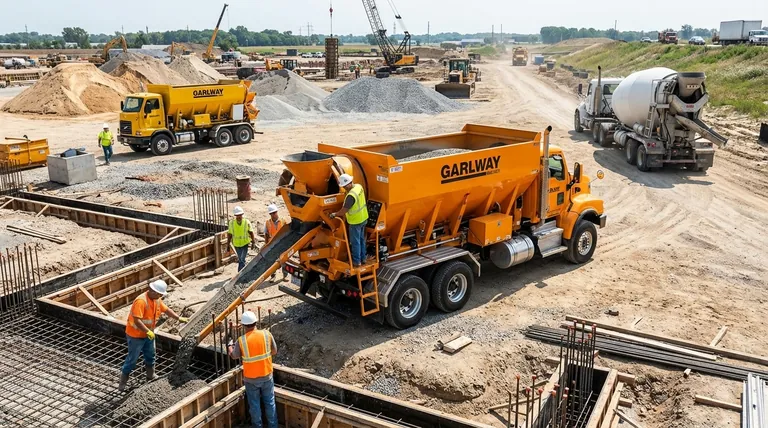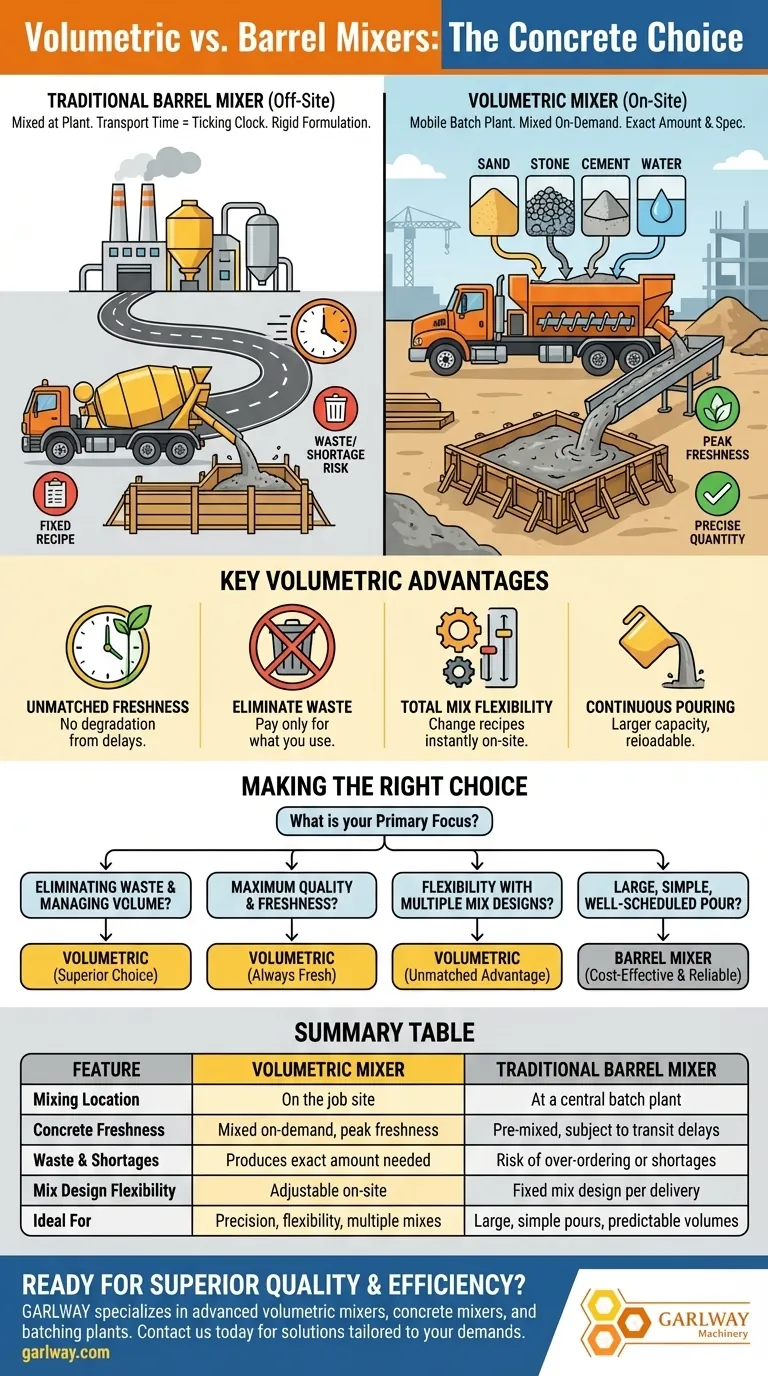The fundamental difference is where the concrete is made. Traditional barrel mixers transport wet, pre-mixed concrete from a central plant, starting a countdown on its workability. Volumetric mixers function as mobile batch plants, mixing fresh concrete on the job site to the exact quantity and specification needed, precisely when it's needed.
This distinction is not merely logistical; it represents a strategic choice between bulk delivery and on-demand manufacturing. Volumetric mixers offer unparalleled control over quality, quantity, and mix design, while barrel mixers serve high-volume, standardized needs.

The Core Operational Divide: On-Site vs. Off-Site Mixing
The most significant factor separating these two technologies is the location of the batching process. This single difference creates a cascade of effects on waste, quality, and project flexibility.
Traditional Barrel Mixers: The Batch Plant Model
A traditional barrel (or drum) mixer is essentially a delivery vehicle. Concrete is mixed at a central batch plant according to a pre-ordered recipe and volume.
From the moment water is added at the plant, a "ticking clock" begins. The concrete immediately starts to hydrate and cure, meaning its workability can degrade due to travel time, traffic, or on-site delays.
Once the mix leaves the plant, its formulation cannot be changed. This rigidity can lead to costly waste if too much is ordered or critical delays and potential cold joints if a shortage occurs.
Volumetric Mixers: The Mobile Plant Model
A volumetric mixer carries unmixed raw materials—sand, stone, cement, water, and chemical admixtures—in separate compartments on a single truck chassis.
Mixing happens on the job site via a calibrated control system. This process ensures the concrete is as fresh as possible, produced just seconds before it is poured.
This on-demand capability allows for precise volume control, eliminating the guesswork that leads to waste or shortages.
Key Advantages of Volumetric Technology
By shifting the mixing process to the job site, volumetric mixers solve several chronic problems associated with traditional concrete delivery.
Unmatched Freshness and Quality
Because the concrete is mixed at the point of use, it is always at peak freshness and strength. This completely avoids any quality degradation that might occur from unforeseen project delays.
Elimination of Waste and Shortages
Volumetric mixers produce the exact amount of concrete required. This "pay for what you use" model prevents the costly disposal of over-ordered batches and avoids the frantic calls to the plant when a pour comes up short.
Total Mix Design Flexibility
Operators can adjust the mix design instantly. A crew can pour a high-strength footing, then immediately switch to a different specification for a slab or wall—all from the same truck during the same visit. Modern control systems allow for these changes with precision.
Larger Capacity for Continuous Pouring
Volumetric trucks often have a larger capacity than standard barrel mixers, sometimes carrying enough material for double the output. For large pours, they can be reloaded on-site to operate continuously.
Understanding the Trade-offs
While volumetric technology offers significant advantages, the choice is dependent on the specific needs of the project.
When a Barrel Mixer Makes Sense
For massive, straightforward pours where a single, certified mix design is required and site logistics are well-managed, a fleet of traditional mixers from a high-capacity plant can be highly efficient. They are well-suited for projects with predictable volumes and "less dynamic requirements."
Considerations for Volumetric Mixers
The quality of the final product is heavily dependent on the accurate calibration of the mixer and the skill of the certified operator. They also require sufficient space on the job site for the truck to operate and potentially be reloaded with raw materials.
Making the Right Choice for Your Project
Selecting the appropriate mixer requires analyzing your project’s core priorities.
- If your primary focus is eliminating waste and managing uncertain volumes: A volumetric mixer is the superior choice, as you only produce and pay for what you need.
- If your primary focus is achieving maximum quality and freshness: A volumetric mixer ensures the concrete is always fresh, avoiding degradation from transport or delays.
- If your primary focus is flexibility with multiple mix designs: The ability of a volumetric mixer to switch recipes on-site is an unmatched advantage.
- If your primary focus is a large, simple, and well-scheduled pour: Traditional barrel mixers can provide a cost-effective and reliable stream of standardized concrete.
Ultimately, choosing the right mixer is about aligning your concrete delivery method with your project's unique demands for precision, flexibility, and efficiency.
Summary Table:
| Feature | Volumetric Mixer | Traditional Barrel Mixer |
|---|---|---|
| Mixing Location | On the job site | At a central batch plant |
| Concrete Freshness | Mixed on-demand, peak freshness | Pre-mixed, subject to transit delays |
| Waste & Shortages | Produces exact amount needed | Risk of over-ordering or shortages |
| Mix Design Flexibility | Adjustable on-site for different pours | Fixed mix design per delivery |
| Ideal For | Projects requiring precision, flexibility, and multiple mix designs | Large, simple pours with predictable volumes |
Ready to achieve superior concrete quality and project efficiency?
GARLWAY specializes in construction machinery, offering advanced volumetric mixers, concrete mixers, and batching plants designed for construction companies and contractors who value precision, flexibility, and waste reduction. Our solutions ensure you get fresh, high-quality concrete exactly when and where you need it.
Contact GARLWAY today to discuss how our machinery can be tailored to your project's unique demands!
Visual Guide

Related Products
- Belle Cement Mixer JS2000 Volumetric Concrete Mixer for Harbor Freight
- Harbor Freight JS1500 On Site Concrete Mixing Volumetric Cement Mixer
- Ready Mixer Machine for Construction Ready Mix Machinery
- Portable Concrete Mixer Machine Equipment for Mixing Concrete
- Hydraulic Concrete Mixer Machine Cement Mixing Equipment for Mixture Concrete
People Also Ask
- What are the main benefits of using a volumetric concrete mixer? Eliminate Waste & Guarantee Freshness
- What is the difference between a volumetric concrete mixer and a concrete mixer? Choose the Right Mixer for Your Project
- What are some innovations in volumetric concrete mixers? Boost Efficiency with On-Demand Production
- What are the main advantages of volumetric concrete mixers? Achieve On-Demand Concrete & Cost Control
- What is the purpose of a volumetric concrete mixer? Gain On-Demand Mixing & Zero Waste



















